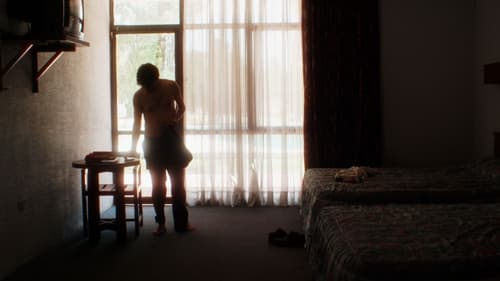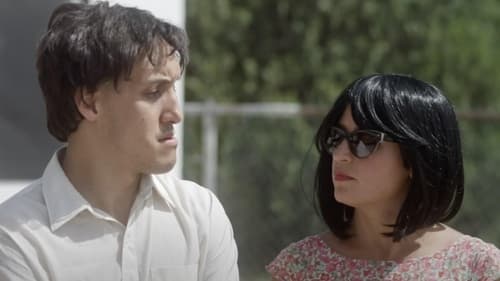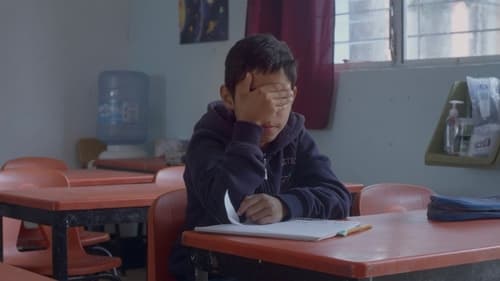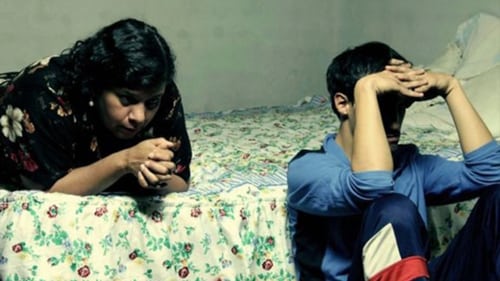
Screenplay
A metacinematic reflection on the nature of representation and the ongoing drug war in Mexico, Nicolás Pereda’s Flora revisits locations and scenes from the mainstream 2010 narco-comedy El Infierno, exploring the paradoxes of depicting narco-trafficking on film—its tendency both to romanticize and to obscure. To screen is both to project and to conceal.

Director
A metacinematic reflection on the nature of representation and the ongoing drug war in Mexico, Nicolás Pereda’s Flora revisits locations and scenes from the mainstream 2010 narco-comedy El Infierno, exploring the paradoxes of depicting narco-trafficking on film—its tendency both to romanticize and to obscure. To screen is both to project and to conceal.

Producer
루이사와 가비노는 부모님이 있는 고향인 광산 마을을 찾아간다. 아버지의 관심은 마약 밀매업 보스 역할을 연기한, 루이사의 배우 남자친구에게 쏠린다. 긴장된 분위기를 풀기 위해 가비노는 어떤 형사와 범죄자 간의 평행 우주를 상상하기 시작한다.

Editor
루이사와 가비노는 부모님이 있는 고향인 광산 마을을 찾아간다. 아버지의 관심은 마약 밀매업 보스 역할을 연기한, 루이사의 배우 남자친구에게 쏠린다. 긴장된 분위기를 풀기 위해 가비노는 어떤 형사와 범죄자 간의 평행 우주를 상상하기 시작한다.

Writer
루이사와 가비노는 부모님이 있는 고향인 광산 마을을 찾아간다. 아버지의 관심은 마약 밀매업 보스 역할을 연기한, 루이사의 배우 남자친구에게 쏠린다. 긴장된 분위기를 풀기 위해 가비노는 어떤 형사와 범죄자 간의 평행 우주를 상상하기 시작한다.

Director
루이사와 가비노는 부모님이 있는 고향인 광산 마을을 찾아간다. 아버지의 관심은 마약 밀매업 보스 역할을 연기한, 루이사의 배우 남자친구에게 쏠린다. 긴장된 분위기를 풀기 위해 가비노는 어떤 형사와 범죄자 간의 평행 우주를 상상하기 시작한다.

Director of Photography
샹탈 아커만을 향한 작은 오마주. 감독은 일련의 유쾌한 상상을 통해 멕시코시티에 있는 자기 여형제의 집을 빌리고 싶다는 아커만에게 답장을 보낸다.

Sound
샹탈 아커만을 향한 작은 오마주. 감독은 일련의 유쾌한 상상을 통해 멕시코시티에 있는 자기 여형제의 집을 빌리고 싶다는 아커만에게 답장을 보낸다.

Editor
샹탈 아커만을 향한 작은 오마주. 감독은 일련의 유쾌한 상상을 통해 멕시코시티에 있는 자기 여형제의 집을 빌리고 싶다는 아커만에게 답장을 보낸다.

Producer
샹탈 아커만을 향한 작은 오마주. 감독은 일련의 유쾌한 상상을 통해 멕시코시티에 있는 자기 여형제의 집을 빌리고 싶다는 아커만에게 답장을 보낸다.

Screenplay
샹탈 아커만을 향한 작은 오마주. 감독은 일련의 유쾌한 상상을 통해 멕시코시티에 있는 자기 여형제의 집을 빌리고 싶다는 아커만에게 답장을 보낸다.

Director
샹탈 아커만을 향한 작은 오마주. 감독은 일련의 유쾌한 상상을 통해 멕시코시티에 있는 자기 여형제의 집을 빌리고 싶다는 아커만에게 답장을 보낸다.

Producer
멕시코국립교육청이 제작한 작품으로, 감독 니콜라스 페레다와 배우 가비노 로드리게즈가 참여해 색소 침착증을 앓는 소년 마티아스에 대한 이야기를 픽션과 다큐멘터리를 혼합한 형태로 만들었다. 메스티소 고아인 마티아스는 백인 부부의 집에 입양된다. 그러나 그에게 색소 침착 증세가 나타나 피부색이 변하자 양부모는 그를 돌려보내고, 학교에서는 다른 아이들에게 증상이 전염될까 봐 아무도 없는 텅 빈 건물에 마티아스를 격리시킨다. 영화 제목은 마리오 베야틴의 동명 소설에서 따왔는데, 그는 영화에도 직접 출연해 자신의 말과 문학을 통해 아픈 몸을 치료할 수 있는 대안적인 가능성을 제시한다.

Music
멕시코국립교육청이 제작한 작품으로, 감독 니콜라스 페레다와 배우 가비노 로드리게즈가 참여해 색소 침착증을 앓는 소년 마티아스에 대한 이야기를 픽션과 다큐멘터리를 혼합한 형태로 만들었다. 메스티소 고아인 마티아스는 백인 부부의 집에 입양된다. 그러나 그에게 색소 침착 증세가 나타나 피부색이 변하자 양부모는 그를 돌려보내고, 학교에서는 다른 아이들에게 증상이 전염될까 봐 아무도 없는 텅 빈 건물에 마티아스를 격리시킨다. 영화 제목은 마리오 베야틴의 동명 소설에서 따왔는데, 그는 영화에도 직접 출연해 자신의 말과 문학을 통해 아픈 몸을 치료할 수 있는 대안적인 가능성을 제시한다.

Screenplay
멕시코국립교육청이 제작한 작품으로, 감독 니콜라스 페레다와 배우 가비노 로드리게즈가 참여해 색소 침착증을 앓는 소년 마티아스에 대한 이야기를 픽션과 다큐멘터리를 혼합한 형태로 만들었다. 메스티소 고아인 마티아스는 백인 부부의 집에 입양된다. 그러나 그에게 색소 침착 증세가 나타나 피부색이 변하자 양부모는 그를 돌려보내고, 학교에서는 다른 아이들에게 증상이 전염될까 봐 아무도 없는 텅 빈 건물에 마티아스를 격리시킨다. 영화 제목은 마리오 베야틴의 동명 소설에서 따왔는데, 그는 영화에도 직접 출연해 자신의 말과 문학을 통해 아픈 몸을 치료할 수 있는 대안적인 가능성을 제시한다.

Editor
멕시코국립교육청이 제작한 작품으로, 감독 니콜라스 페레다와 배우 가비노 로드리게즈가 참여해 색소 침착증을 앓는 소년 마티아스에 대한 이야기를 픽션과 다큐멘터리를 혼합한 형태로 만들었다. 메스티소 고아인 마티아스는 백인 부부의 집에 입양된다. 그러나 그에게 색소 침착 증세가 나타나 피부색이 변하자 양부모는 그를 돌려보내고, 학교에서는 다른 아이들에게 증상이 전염될까 봐 아무도 없는 텅 빈 건물에 마티아스를 격리시킨다. 영화 제목은 마리오 베야틴의 동명 소설에서 따왔는데, 그는 영화에도 직접 출연해 자신의 말과 문학을 통해 아픈 몸을 치료할 수 있는 대안적인 가능성을 제시한다.

Director of Photography
멕시코국립교육청이 제작한 작품으로, 감독 니콜라스 페레다와 배우 가비노 로드리게즈가 참여해 색소 침착증을 앓는 소년 마티아스에 대한 이야기를 픽션과 다큐멘터리를 혼합한 형태로 만들었다. 메스티소 고아인 마티아스는 백인 부부의 집에 입양된다. 그러나 그에게 색소 침착 증세가 나타나 피부색이 변하자 양부모는 그를 돌려보내고, 학교에서는 다른 아이들에게 증상이 전염될까 봐 아무도 없는 텅 빈 건물에 마티아스를 격리시킨다. 영화 제목은 마리오 베야틴의 동명 소설에서 따왔는데, 그는 영화에도 직접 출연해 자신의 말과 문학을 통해 아픈 몸을 치료할 수 있는 대안적인 가능성을 제시한다.

Director
멕시코국립교육청이 제작한 작품으로, 감독 니콜라스 페레다와 배우 가비노 로드리게즈가 참여해 색소 침착증을 앓는 소년 마티아스에 대한 이야기를 픽션과 다큐멘터리를 혼합한 형태로 만들었다. 메스티소 고아인 마티아스는 백인 부부의 집에 입양된다. 그러나 그에게 색소 침착 증세가 나타나 피부색이 변하자 양부모는 그를 돌려보내고, 학교에서는 다른 아이들에게 증상이 전염될까 봐 아무도 없는 텅 빈 건물에 마티아스를 격리시킨다. 영화 제목은 마리오 베야틴의 동명 소설에서 따왔는데, 그는 영화에도 직접 출연해 자신의 말과 문학을 통해 아픈 몸을 치료할 수 있는 대안적인 가능성을 제시한다.

Producer
On the Oaxacan coast of Mexico, rumblings of previous times are never far from the surface. Tales of shapeshifting, telepathy and dealings with the Devil are embedded in the colonization and enslavement of the Americas. Characters from the Faust legend mingle with the inhabitants, while attempting to colonize and control nature through a seemingly never-ending building project. Through literature, myth and local entanglements, the frontier between reality and fiction, and the seen and unseen, no longer apply.

Writer
Acclaimed Mexican Canadian filmmaker Nicolás Pereda presents a film/performance/lecture on the life and work of “C.B.,” an artist, political activist, amateur archeologist, and anarchist.

Director
Acclaimed Mexican Canadian filmmaker Nicolás Pereda presents a film/performance/lecture on the life and work of “C.B.,” an artist, political activist, amateur archeologist, and anarchist.

Director
Tales of Two Who Dreamt is set in a housing block in Toronto and pivots on representation and self-representation. Here, a Roma family rehearses the stories of their past for the upcoming hearing on their residency status.

Director
Eleven award winning directors explore why nearly one out of every two students in Latin America never graduates high school.

Editor
Minotaur takes place in a home of books, of readers, of artists. It’s also a home of soft light, of eternal afternoons, of sleepiness, of dreams. The home is impermeable to the world. Mexico is on fire, but the characters of Minotaur sleep soundly.

Screenplay
Minotaur takes place in a home of books, of readers, of artists. It’s also a home of soft light, of eternal afternoons, of sleepiness, of dreams. The home is impermeable to the world. Mexico is on fire, but the characters of Minotaur sleep soundly.

Director
Minotaur takes place in a home of books, of readers, of artists. It’s also a home of soft light, of eternal afternoons, of sleepiness, of dreams. The home is impermeable to the world. Mexico is on fire, but the characters of Minotaur sleep soundly.

Director
An old man lives alone in a shabby cabin in a remote mountainous area of Mexico. His house is set to be demolished in order to facilitate the redevelopment of the area. He doesn't know how to protect his house. Time goes by and one day a young man shows up on his doorstep. Looking exhausted, he starts his new routine here, cooking and doing laundry just like the old man.

Screenplay
The Palace is a documentary that follows the everyday life of seventeen women who live together, sharing a large house for emotional and financial reasons. They help each other to train for various jobs. Most become nannies, domestic workers and private nurses for elderly patients.

Director
The Palace is a documentary that follows the everyday life of seventeen women who live together, sharing a large house for emotional and financial reasons. They help each other to train for various jobs. Most become nannies, domestic workers and private nurses for elderly patients.

Director
베니스영화제 70주년을 맞아 세계 각국의 감독들이 만든 2분 내외의 짧은 단편들로 구성한 옴니버스 영화. 한국에서는 김기덕, 홍상수 감독이 참여했으며 그 외에도 지아장커, 클레어 드니, 왕빙, 압바스 키아로스타미 등 70명의 감독들이 참여했다.

Director
는 유럽과 비유럽권 감독이 짝을 이뤄 공동연출로 하나의 작품을 만드는 DOX:LAB의 프로젝트이다. 에서는 멕시코의 니콜라스 페레다와 편집기사 출신의 덴마크 감독 야콥 세세르 쉴싱에르가 만났다. 서로 다른 배경과 미학적 태도를 가진 두 감독을 하나로 묶는다는 아이디어의 위험성, 더구나 두 사람은 일면식도 없는 관계였으니 상당한 모험인 셈이다. 영화는 1910년 멕시코 혁명에 합류하기 위해 사막을 표랑하는 세 젊은이를 좇는 이야기와 박물관 모양의 거실에서 이루어지는 배우들의 오디션을 병치하고 있다. 멕시코 편은 픽션, 오디션 편은 다큐멘터리 푸티지처럼 연출되었다. 전문 배우가 출연한 멕시코 편은 조용하고, 오디션 편은 비전문 배우들의 열연으로 뜨겁다. 거듭되는 두 갈래 서사의 교차는 ‘관점들의 교환’처럼 보인다. 긍정하든, 부정하든 특정한 지역의 감독들은 그 지역의 영화를 만든다. 유럽적인 것과 라틴 아메리카적인 것의 교환, 지역과 정서, 미학의 교환을 확인할 수 있다. (2014년 제15회 전주국제영화제_장병원)

Editor
When Gabino's father returns home after a long absence, the two men awkwardly attempt to re-establish a relationship; but Gabino and his mother quickly tire of this man who has become a stranger to them and decide to kick him out, before realizing that he has already left. Gabino eventually tracks his father down and spends time with him in his rundown apartment, trying to figure out if there is any possibility for the two of them to ever truly communicate. Though Greatest Hits continues Pereda's exploration of his perennial themes of absence, masculinity and the difficulty of maintaining a family, it opens up a whole new set of aesthetic questions through a bold formal gambit: halfway through, the entire narrative reboots and starts from scratch with another actor playing one of the key characters, leading to different iterations of events already witnessed.

Writer
When Gabino's father returns home after a long absence, the two men awkwardly attempt to re-establish a relationship; but Gabino and his mother quickly tire of this man who has become a stranger to them and decide to kick him out, before realizing that he has already left. Gabino eventually tracks his father down and spends time with him in his rundown apartment, trying to figure out if there is any possibility for the two of them to ever truly communicate. Though Greatest Hits continues Pereda's exploration of his perennial themes of absence, masculinity and the difficulty of maintaining a family, it opens up a whole new set of aesthetic questions through a bold formal gambit: halfway through, the entire narrative reboots and starts from scratch with another actor playing one of the key characters, leading to different iterations of events already witnessed.

Director
When Gabino's father returns home after a long absence, the two men awkwardly attempt to re-establish a relationship; but Gabino and his mother quickly tire of this man who has become a stranger to them and decide to kick him out, before realizing that he has already left. Gabino eventually tracks his father down and spends time with him in his rundown apartment, trying to figure out if there is any possibility for the two of them to ever truly communicate. Though Greatest Hits continues Pereda's exploration of his perennial themes of absence, masculinity and the difficulty of maintaining a family, it opens up a whole new set of aesthetic questions through a bold formal gambit: halfway through, the entire narrative reboots and starts from scratch with another actor playing one of the key characters, leading to different iterations of events already witnessed.

Producer
Summer of Goliath is a documentary/fiction hybrid that narrates various stories of the people of the town of Huilotepec in rural Mexico. Teresa's husband has disappeared and she believes he has left her for another woman. Gabino, her son, is a soldier who searches cars at the side of a country road, where very few cars pass by. He hopes one day him and Alberto, his soldier partner, will get machine guns to further intimidate the people driving by. Amalio, Nico, and Oscar are three brothers whose stories we learn through a series of interviews and reenactments. Their father left them many years ago, and their mother can barely support them. Oscar has gained the nickname Goliath after the mysterious death of his girlfriend.

Writer
Summer of Goliath is a documentary/fiction hybrid that narrates various stories of the people of the town of Huilotepec in rural Mexico. Teresa's husband has disappeared and she believes he has left her for another woman. Gabino, her son, is a soldier who searches cars at the side of a country road, where very few cars pass by. He hopes one day him and Alberto, his soldier partner, will get machine guns to further intimidate the people driving by. Amalio, Nico, and Oscar are three brothers whose stories we learn through a series of interviews and reenactments. Their father left them many years ago, and their mother can barely support them. Oscar has gained the nickname Goliath after the mysterious death of his girlfriend.

Editor
Summer of Goliath is a documentary/fiction hybrid that narrates various stories of the people of the town of Huilotepec in rural Mexico. Teresa's husband has disappeared and she believes he has left her for another woman. Gabino, her son, is a soldier who searches cars at the side of a country road, where very few cars pass by. He hopes one day him and Alberto, his soldier partner, will get machine guns to further intimidate the people driving by. Amalio, Nico, and Oscar are three brothers whose stories we learn through a series of interviews and reenactments. Their father left them many years ago, and their mother can barely support them. Oscar has gained the nickname Goliath after the mysterious death of his girlfriend.

Director
Summer of Goliath is a documentary/fiction hybrid that narrates various stories of the people of the town of Huilotepec in rural Mexico. Teresa's husband has disappeared and she believes he has left her for another woman. Gabino, her son, is a soldier who searches cars at the side of a country road, where very few cars pass by. He hopes one day him and Alberto, his soldier partner, will get machine guns to further intimidate the people driving by. Amalio, Nico, and Oscar are three brothers whose stories we learn through a series of interviews and reenactments. Their father left them many years ago, and their mother can barely support them. Oscar has gained the nickname Goliath after the mysterious death of his girlfriend.

Editor
Carefully shot in black and white, All Things Were Now Overtaken by Silence is a meditation on the filming of a strange play: a fascinating monologue by actress, director, performance artist and political activist Jesusa Rodriguez of Sor Juana Ines de la Cruz’s poem First I Dream.

Director
Carefully shot in black and white, All Things Were Now Overtaken by Silence is a meditation on the filming of a strange play: a fascinating monologue by actress, director, performance artist and political activist Jesusa Rodriguez of Sor Juana Ines de la Cruz’s poem First I Dream.

Editor
An itinerant mover works from the streets of Mexico City with his partner and lives with his beleaguered mother. A heightened tension within the home – by the absent older brother and unmentioned father. Gabino's casual pursuit of a career is interrupted by a series of intense and almost satirically telenovela-esque domestic vignettes.

Writer
An itinerant mover works from the streets of Mexico City with his partner and lives with his beleaguered mother. A heightened tension within the home – by the absent older brother and unmentioned father. Gabino's casual pursuit of a career is interrupted by a series of intense and almost satirically telenovela-esque domestic vignettes.

Director
An itinerant mover works from the streets of Mexico City with his partner and lives with his beleaguered mother. A heightened tension within the home – by the absent older brother and unmentioned father. Gabino's casual pursuit of a career is interrupted by a series of intense and almost satirically telenovela-esque domestic vignettes.

Screenplay
Gabino, Luisa and Paco share a small apartment in Mexico City. With no money and nothing to do they decice to leave the city.

Editor
Gabino, Luisa and Paco share a small apartment in Mexico City. With no money and nothing to do they decice to leave the city.

Director
Gabino, Luisa and Paco share a small apartment in Mexico City. With no money and nothing to do they decice to leave the city.

Director
Through a series of interviews and enactments we learn the story of Nico and Amalio, two children who lost a friend while climbing a mountain. Documentary and fiction seamlessly merge creating a hybrid, poetic film.

Casting
Vicente (Gabino Rodríguez) is a young farmer in a rural village who scrapes by while taking care of his ill grandmother. Several of Vicente’s uncles intend to their ailing mother’s land without her knowledge. Vicente seeks help from the municipal president who, between shooting hoops on a desolate court, tells him that if he wants justice, he must head to the capital to meet with government officials. Although he hasn’t seen her since he was a child, Vicente sets off in search of his mother, who works as a maid in maze-like Mexico City. With the help of his mother’s employer, a sophisticated middle-aged woman, he finds the government offices where he presents his case. His situation isn’t easily resolved, especially since he does not have the deed to his grandmother’s plot of land, and Vicente finds the complexities of the legal system to be completely overwhelming.

Editor
Vicente (Gabino Rodríguez) is a young farmer in a rural village who scrapes by while taking care of his ill grandmother. Several of Vicente’s uncles intend to their ailing mother’s land without her knowledge. Vicente seeks help from the municipal president who, between shooting hoops on a desolate court, tells him that if he wants justice, he must head to the capital to meet with government officials. Although he hasn’t seen her since he was a child, Vicente sets off in search of his mother, who works as a maid in maze-like Mexico City. With the help of his mother’s employer, a sophisticated middle-aged woman, he finds the government offices where he presents his case. His situation isn’t easily resolved, especially since he does not have the deed to his grandmother’s plot of land, and Vicente finds the complexities of the legal system to be completely overwhelming.

Screenplay
Vicente (Gabino Rodríguez) is a young farmer in a rural village who scrapes by while taking care of his ill grandmother. Several of Vicente’s uncles intend to their ailing mother’s land without her knowledge. Vicente seeks help from the municipal president who, between shooting hoops on a desolate court, tells him that if he wants justice, he must head to the capital to meet with government officials. Although he hasn’t seen her since he was a child, Vicente sets off in search of his mother, who works as a maid in maze-like Mexico City. With the help of his mother’s employer, a sophisticated middle-aged woman, he finds the government offices where he presents his case. His situation isn’t easily resolved, especially since he does not have the deed to his grandmother’s plot of land, and Vicente finds the complexities of the legal system to be completely overwhelming.

Mesero
Vicente (Gabino Rodríguez) is a young farmer in a rural village who scrapes by while taking care of his ill grandmother. Several of Vicente’s uncles intend to their ailing mother’s land without her knowledge. Vicente seeks help from the municipal president who, between shooting hoops on a desolate court, tells him that if he wants justice, he must head to the capital to meet with government officials. Although he hasn’t seen her since he was a child, Vicente sets off in search of his mother, who works as a maid in maze-like Mexico City. With the help of his mother’s employer, a sophisticated middle-aged woman, he finds the government offices where he presents his case. His situation isn’t easily resolved, especially since he does not have the deed to his grandmother’s plot of land, and Vicente finds the complexities of the legal system to be completely overwhelming.

Director
Vicente (Gabino Rodríguez) is a young farmer in a rural village who scrapes by while taking care of his ill grandmother. Several of Vicente’s uncles intend to their ailing mother’s land without her knowledge. Vicente seeks help from the municipal president who, between shooting hoops on a desolate court, tells him that if he wants justice, he must head to the capital to meet with government officials. Although he hasn’t seen her since he was a child, Vicente sets off in search of his mother, who works as a maid in maze-like Mexico City. With the help of his mother’s employer, a sophisticated middle-aged woman, he finds the government offices where he presents his case. His situation isn’t easily resolved, especially since he does not have the deed to his grandmother’s plot of land, and Vicente finds the complexities of the legal system to be completely overwhelming.







